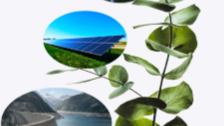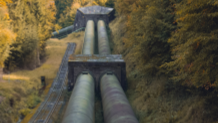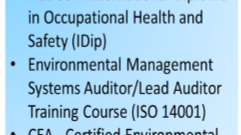M.Tech. in Environmental Engineering and Management
On this page
Overview
The aim of the programme is to produce postgraduates with advanced knowledge and understanding of Environmental Engineering and Management; critical thinking, analytical-problem solving and transferable skills; ability to think rigorously and independently to meet higher level expectations of industry, academics, research or take up Entrepreneurial route. Students will be able to apply the knowledge, understanding and skills acquired to carry sustainable Solid Waste and Wastewater Management through Research and Technological Inputs. Students also will be capable to carry out engineering design, simulation, analysis, synthesis and evaluation of Waste treatment processes and operation. Curriculum also emphasises on adopting interdisciplinary and creative approach in resource conservation and resource efficiency through waste prevention and by recovering valuable material and/or energy.
Objective
- Explain the role of sanitation in the urban water cycle and its relation to public health and environment
- Critically analyse, assess and evaluate various urban drainage and sewerage schemes, and wastewater, sludge and solid waste treatment process technologies
- Suggest options for waste reduction at source so as to reduce quantities of waste generated
- Develop rational approaches towards sustainable wastewater management via pollution prevention
- Design Sewage and solid waste treatment plant
- Choose from an array of options to turn waste into economic goods
- Develop a solid waste management scheme for an urban area
- Planning and controlling a waste treatment project cost including cost estimating, risk analysis, determination of contingencies, progress reporting and value engineering
- Knowledge of IT tools and Apply modern tools for technology selection and to model sanitation components
- Teamwork, lifelong learning and continuous improvement
Highlights
- The program is designed to train young Scientist-Engineers to deal with the complex challenges of the environmental waste characterization, treatment and safe disposal
- Syllabus imparting state-of-art knowledge and practical sessions form the core of the Environmental engineering process.
- Highly qualified faculty members with several years of research and Industrial experience.
- Comprehensive program with exposure to all aspects of the environment — air, water, solid and hazardous waste, sustainability, and more.
- Highly collaborative interdisciplinary program and foster teamwork
- Active Industry-academia interaction through guest lectures, Industrial training, seminars, and symposia
- The program focus to training and educate engineering graduates and mid-career engineers who want to take on more advanced roles and responsibilities
Accomplishments
- Presenting research papers at various National and International conferences and winning prizes and appreciation
- Shortlisted as Best innovation concept for Smart India Hackathon (Hardware edition) 2020 by MHRD ‑IIC
- Eminent programme with state of art teaching aids and continuous investment towards its up-gradation
- Internship for postgraduate students at Moscow State University of Civil Engineering (MGSU)
- MoU’s with international universities like St. Petersburg University of Architecture and Civil Engineering, Moscow State University of Civil Engineering, the University of Illinois at Urbana Champaign
- MoU with Waste to Energy Research Technology (WtERT-Global) (Columbia-USA).Center for Study of Science, Technology and policy CSTEP-Bengaluru to provide better research opportunity
- Conducted two International Conferences on Solid Waste Management in collaboration with WtERT-India
- Government institute interaction –CSIR-NEERI
Online Elective
There is also a provision for students to choose elective courses through online mode such as MOOC’s, SWAYAM, NPTEL and other equivalent platforms. For such courses students should adhere to the guidelines prescribed by the University.
International Competitions
The student can also earn 3 or 4 credits by participating in the international competitions like technical presentation/conference/publications in the journal etc., and winning the award in that. In that case he/she can be exempted from one of the elective courses of the programme
Group Project
A group of up to 5 students can come together to work on an interdisciplinary project in consultation with faculty. Students are required to develop a report for assessment and demonstrate the working of the product, and the project needs to be approved by a committee before it is executed. The IPR rights of all such work lies with the University only.
Industry Internship or Project
A student can opt for an internship in an industry, a business or research organisation. Alternately, students can undertake a mini-project which requires self-directed study that can be pursued with an affiliated faculty member. The internship needs to be approved by the HoD and Dean and students have to submit a report and make a presentation to a panel constituted by the HoD for assessment. Students also have the opportunity to pursue their internship at Moscow State University of Civil Engineering (MGSU).
Dissertation and Publication
This course includes a dissertation and publication. Each student has to choose a relevant topic for a dissertation and this needs to be approved by a committee constituted by the HoD. The dissertation should then be converted into a technical paper published in reputed conferences or journals.
- Fosters prudent, well-qualified and dedicated faculty members.
- Offers a learner-centric, outcome-based education.
- Ensures students have world-class learning facilities with applied learning.
- Emphasises projects from the industry for employability in environmental engineering.
- Offers a vibrant research space with state-of-the-art facilities.
- Includes guest lectures, internships, industry visits, group projects, dissertations, and workshops.
- Includes associations with leading professional bodies.
- Offers fully structured job-oriented courses.
- We offer accommodation in student hostels on our campus, and even offer third-party off-campus hotels where necessary to ensure students can focus on what matters the most.
- Our on-campus facilities include WiFi any time of the day, 24/7.
- From a host of eateries and laundry facilities, we ensure that students have access to all facilities.
- We encourage students to participate in co-curricular activities on campus which include sports and cultural events, both at a university level and a faculty level.
- We help students focus on independent and sponsored research with projects and a dissertation.
Structure
Study Domains
- CS
Course Specialisation
Critical and analytical skills in problem-solving in environmental engineering and management for meeting the expectations of industry, academia, research or entrepreneurial roles.
- DCC
Department & Common Courses
- Interactive and focused deep learning in the core domain of civil engineering which includes environmental impact assessment, environmental management, and environmental sustainability.
- MC
Mandatory Courses
- Courses in Public Health Engineering, Modern Methods of Waste Characterisation, Waste Water Treatment Plant Design, Solid Waste and Hazardous Waste Management, Solid Waste and Hazardous Waste Treatment Plant Design, and Environmental Biotechnology.
- DSS
Dissertation
- An introduction to professional and personal development, language courses, and life skills.
- GP
Group Projects:
- EC
Elective Course
Active participation and output based assignments, guest talks, site visits, projects, seminars and internships in industry and universities abroad.
- FCC
Faculty Common Course
Course Progression
| Course | Credits |
|---|---|
Public Health Engineering | 4 |
Modern Methods of Waste Characterization | 4 |
Wastewater Treatment Plant Design | 5 |
Refer Elective Course Table/MOOC | 4 |
Refer Elective Course Table/MOOC | 4 |
Research Methodology & IPR | 2 |
Professional Communication | 0 |
Key
- Theory
- Tutorials
- Practicals
| Course | Credits |
|---|---|
Solid waste and hazardous waste management | 4 |
Solid waste and hazardous waste treatment plant design | 4 |
Environmental biotechnology | 4 |
Refer Elective Course Table/MOOC | 4 |
Refer Elective Course Table/ MOOC | 4 |
Value Education | 0 |
Group Project (Start) | 3 |
Key
- Theory
- Tutorials
- Practicals
| Course | Credits |
|---|---|
Internship | 4 |
Group project | 8 |
Key
- Theory
- Tutorials
- Practicals
| Course | Credits |
|---|---|
Dissertation and Publication Phase - II | 24 |
Key
- Theory
- Tutorials
- Practicals
Details
Semester 4 (Electives)
| Stream/Specialisation | Elective | Course Title |
|---|---|---|
| Stream1: Environmental pollution and control | E11 | Air pollution and Control |
| Stream1: Environmental pollution and control | E12 | Toxicology and environmental risk assessment |
| Stream1: Environmental pollution and control | E13 | Environmental remediation of contaminated sites |
| Stream1: Environmental pollution and control | E14 | Aquatic biodiversity and environmental pollution |
| Stream 2: Energy efficiency | E21 | Energy in built environment |
| Stream 2: Energy efficiency | E22 | Renewable energy and environmental impact |
| Stream 2: Energy efficiency | E23 | Alternative fuels |
| Stream 2: Energy efficiency | E24 | Industrial and commercial applications of renewable energy sources |
| Stream 3: Waste management | E31 | Rural water supply and sanitation |
| Stream 3: Waste management | E32 | Integrated waste management in smart cities |
| Stream 3: Waste management | E33 | Entrepreneurship in waste management |
| Stream 3: Waste management | E34 | Transport process and modelling of aquatic system |
| Stream 4: Interdisciplinary | E41 | Geo-environmental engineering |
| Stream 4: Interdisciplinary | E42 | Remote sensing and GIS in environmental engineering |
| Stream 4: Interdisciplinary | E43 | Treatment Plants Operations and Maintenance |
| Stream 4: Interdisciplinary | E44 | Environmental policies and legislation |
Teaching and Assessment
Student performance in each course is assessed through an assignment (with 50% weightage) and an examination (with 50% weightage). A student is required to score a minimum of 40% in each of the components and 40% overall for the successful completion of a course and for earning the corresponding credit(s).
Key Skill Development
- Ability to analyse, assess, and evaluate aspects of urban drainage, sewage schemes, sludge, and solid waste treatment technologies.
- Ability to recommend options for waste reduction at the source to reduce quantities of waste generated.
- Ability to develop rational approaches towards sustainable wastewater management via pollution prevention.
- Ability to design sewage and solid waste treatment plants.
- Ability to choose from an array of options to turn waste into economic goods.
- Ability to develop a solid waste management scheme for an urban area by planning, cost estimation, risk analysis, determination of contingencies, progress reporting and value engineering.
- Ability to use and select appropriate IT tools to model sanitation components.
- Ability to work in a team, and be committed to lifelong learning and self-improvement.
Careers
Environmental Engineer
Admissions
Eligibility
Indian Nationals
- Candidates must have a BE or B Tech or equivalent in Civil Engineering; or, they should have degrees in Architecture, Construction Technology, Mechanical, Aeronautical, Transportation Engineering, Automotive and Automobile , Industrial Production Engineering or Allied Disciplines related to Civil Engineering.
- Candidates who belong to SC/ST categories are given a different qualifying mark as per government notifications.
Application Process
University Quota
Candidates seeking admission are required to contact the admissions department for more details.
Through Government of Karnataka Quota
- PGCET, Counselling and Selection (PGCET Code T945)
- Download the admission form
- Submit completed form and documents at the University Admissions Office
- Pay fees online or through DD at the University admission Office. See full instruction
Fees & Scholarships
Government Seats:
- As per Government of Karnataka for Indian nationals
University Seats:
- Refer Fee Structure
Eligibility
International Students/OCI/NRI
- Candidates should have the equivalent qualification approved by Association of Indian Universities.
- Should have proof of proficiency in English with a minimum TOEFL score of 8
Application Process
University Quota
Candidates seeking admission are required to contact the admissions department for more details.
Through Government of Karnataka Quota
- PGCET, Counselling and Selection (PGCET Code T945)
- Download the admission form
- Submit completed form and documents at the University Admissions Office
- Pay fees online or through DD at the University admission Office. See full instruction
Fees & Scholarships
NRI/ Foreign Students:
- USD 6000 + Other fee Rs.38,550 per annum
Start your journey with RUAS
Downloads
- M.Tech Programme Regulations 2019 pdf | 1.3 MB
- M.Tech (EEM) Programme Specifications 2018 pdf | 819.2 KB
- M.Tech (EEM) Programme Specifications 2019 pdf | 948.7 KB
- M.Tech (EEM) Programme Specifications 2020 pdf | 948.7 KB
Contact
- Director - Admissions
- Dr. T. Hemanth
- email hidden; JavaScript is required
- Phone
- +91 80 4536 6616
Programmes
- M.Tech. in Data Science and Engineering
- M.Tech in Artificial Intelligence & Machine Learning
- M. Tech. in Power Electronics and Drives
- B.Tech. in Electrical and Electronics Engineering
- M.Tech. in Environmental Engineering and Management
- M.Tech. in Transportation Engineering
- M. Tech. in Automotive Engineering
- B.Tech. in Aerospace Engineering
- B.Tech. in Automotive Engineering
-
- M.Tech. in Aerospace Engineering
- B.Tech. in Computer Science and Engineering
- B. Tech. in Artificial Intelligence and Machine Learning
- M. Tech. in Advanced Machinery Design
- M. Tech. in Manufacturing Technologies and Engineering Management
- M.Tech. in Robotic Engineering
- M.Tech. in VLSI and Nanotechnology
- Electric Transportation
- Embedded System
- Machine Learning
- Mechanical Design
- M. Tech. in Structural Engineering




